Digital Payments
Digital technology is transforming the way we respond to emergencies. Innovations range from how we identifying people eligible for assistance, to data collection for assessments and monitoring, to communication with crisis-affected communities. Digital payment systems, including mobile devices, electronic vouchers, and cards – when used appropriately – can deliver timelier, more secure, more cost effective, and inclusive assistance. But as the volume of data we collect, store and share about people grows, we must ensure that our data protection systems keep pace and that we understand and mitigate for the risks inherent in new technologies.
Featured Content

Podcast: Is informed consent possible in humanitarian CVA?
Podcast
Episode 2 of the CashCast tackles data responsibility with Amos Doornbos, Linda Raftree, James Eaton Lee and Ric Tighe

Consent and Ownership in the Shift to Digital Cash and Voucher Assistance
Blog Post
Part of committing to cash and voucher assistance (CVA) is committing to going digital and collecting data. While they are two different things, they are deeply intertwined. And while an organisation can ‘go digital’ without cash programmes, it’s nearly impossible to commit to cash programmes in the long term without going digital. Yes, it is true we’ve done cash and voucher programmes...
Latest

DFID Shock-Responsive Social Protection Systems research: Literature review
Report
DFID has commissioned research into Shock-Responsive Social Protection systems, to further understand the nature of the interaction between social protection, humanitarian and disaster risk management systems and ways in which long-term social protection systems can be scaled up to
provide support in...

ELAN Workshop Report: E-Transfers in Iraq and Syria
Report
This report outlines the main conclusions and takeways of ELAN workshop held in Iraq. The event was organized to meet the following objectives: Introduce participants to the what, why, and when of e-transfers. Explore solutions to the particular challenges of using e-transfers in Iraq and Syria. Share...
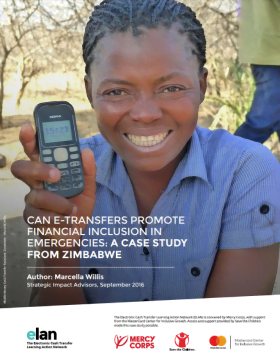
Can E-Transfers Promote Financial Inclusion in Emergencies: A Case Study from Zimbabwe
Case Study
The Electronic Cash Transfer Learning Action Network (ELAN) launched research to build an evidence base around connecting emergency electronic transfer (e-transfer) recipients with additional financial services. They wanted to learn if, when, and how e-transfers can promote sustained uptake and use...

ELAN Vocabulary and Usage
Guidelines and Tools
As e-transfer programs, technologies and products develop, key terms, phrases and working definitions are evolving alongside them. At the moment, these words and phrases are rarely standardized, and often hold unique meanings within different contexts and to different stakeholders. In order to facilitate...

Partnering with FSPs to Deliver Cash in Nepal: Top Considerations
Guidelines and Tools
Cash transfers are a proven way to help disaster-affected communities flexibly meet urgent basic needs. Several humanitarian agencies are planning cash transfers to support tens of thousands of Nepali earthquake survivors. While initial responses will likely rely on direct cash in envelopes, cash...

Cash Transfers in Humanitarian Contexts
Report
Upon request of the Inter-Agency Standing Committee (IASC) Principals at their meeting on December 11, 2015, the World Bank agreed to coordinate a process of reviewing key issues and options for significantly scaling up the use of multipurpose cash transfers (MPCTs; including digital cash and vouchers) in...

Data management and protection starter kit: Tip sheet 1: Privacy Impact Assessment (PIA)
Guidelines and Tools
A Privacy Impact Assessment (PIA) is a systematic analysis of the potential privacy risks related to data collected during program implementation. A PIA analyzes threats and risks to program data, including any legal and environmental factors, and develops mitigation strategies. PIAs help humanitarians...
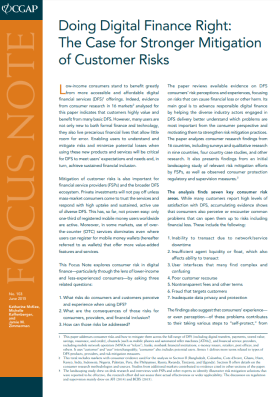
Doing Digital Finance Right: The case for stronger mitigation of customer risks
Policy paper
Low-income consumers stand to benefit greatly from more accessible and affordable digital financial services (DFS) offerings. Indeed, evidence from consumer research in 16 markets analyzed for this paper indicates that customers highly value and benefit from many basic DFS. However, many users are not...
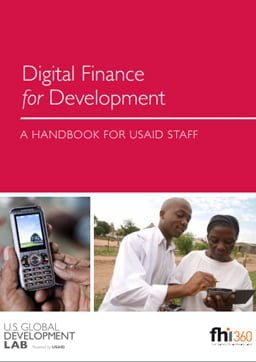
Digital Finance for Development: A Handbook for USAID Staff
Guidelines and Tools
This handbook is designed to enable USAID personnel to maximize the Agency’s use of and contribution to the growth of digital financial services in emerging markets around the world. As an Agency, USAID brings significant comparative advantages to the collective effort required to build out financial...
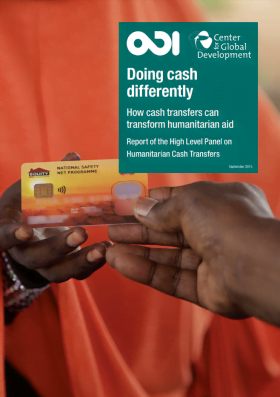
Doing Cash Differently: How cash transfers can transform humanitarian aid?
Policy paper
This report commissioned by the Overseas Development Institute highlights why giving aid directly in the form of cash is often a highly effective way to reduce suffering and to make limited humanitarian aid budgets go further. The publication, ,written by the High Level Panel on Humanitarian...
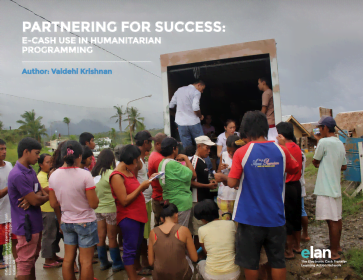
Partnering for Success: E-cash use in humanitarian programming
Policy paper
In recent years, new technologies have facilitated electronic cash transfers (e-transfers) to disaster- and conflict-affected populations. Utilizing e-cash in emergency response requires close partnerships with Financial Service Providers (FSPs), often in places where electronic payments are still...

Cash in Emergencies Toolkit
Guidelines and Tools
Access Toolkit Here Cash transfer based programming (CTP) is an effective and flexible way to support people affected by emergencies, maintaining their dignity and choice, while fostering local economies. CTP includes all forms of cash and voucher-based assistance. The Cash in Emergencies Toolkit has been...

Challenges and the State of Play of Interoperability in Cash Transfer Programming
Guidelines and Tools
This study explores the factors driving the design of interoperability for Cash Transfer Programming. It outlines the rapidly changing environment in which digital services are emerging, the types of digital collaborations that could be enabled, and the key design challenges that confront effective...
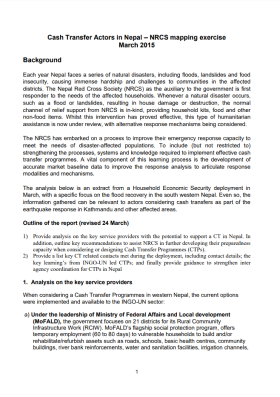
Cash Transfer Actors in Nepal – NRCS Mapping Exercise
Report
Each year Nepal faces a series of natural disasters, including floods, landslides and food insecurity, causing immense hardship and challenges to communities in the affected districts. The Nepal Red Cross Society (NRCS) as the auxiliary to the government is first responder to the needs of the affected...
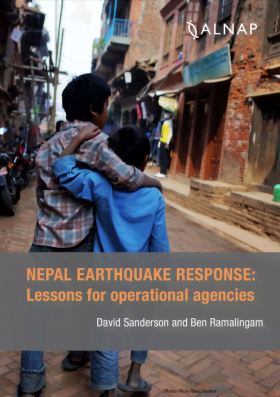
Nepal Earthquake Response: Lessons for operational agencies
Policy paper
In the aftermath of the April 2015 earthquake in Nepal, this paper looks at lessons drawn from previous comparable disasters and seeks to provide invaluable information and assistance to the operational agencies responding to the crisis. Seventeen Lessons give an overview of important learnings based on...

2015 State of the Industry Report. Mobile Money
Report
Mobile money is reaching more than 411 million people globally. Moreover, it is available in 85% of countries where the vast majority of the population lacks access to a formal financial institution. This is an extraordinary achievement, demonstrating the power of mobile, underpinned by the critical...

State of the Use of Mobile Technologies for Disaster Preparedness in South East Asia
Report
This report summarizes the study conducted by Nanyang Technology University (NTU) in collaboration with the Global Disaster Preparedness Center with support from the USAID-Office of Foreign Disaster Assistance to better understand how new communication and information sharing technologies can enhance risk...

Seeking Solutions: New roles for technology in cash and voucher programs – An inspiration brief for technology and private sector partners
Policy paper
Today, more people have been forced to flee their homes than at the height of World War II. The scale of these humanitarian crises are challenging, and sometimes outpacing, the capacity of institutions created to respond to them. Yet, the approaches we have available to reach populations in need have also...
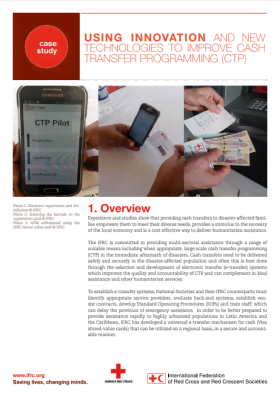
Using Innovation And New Technologies to Improve Cash Transfer Programming (CTP)
Report
Experience and studies show that providing cash transfers to disaster-affected families empowers them to meet their diverse needs, provides a stimulus to the recovery of the local economy and is a cost effective way to deliver humanitarian assistance. The IFRC is committed to providing multi-sectoral...

Financial Services Primer for Humanitarians
Guidelines and Tools
Financial services facilitate a wide range of economic and households activities in any society. They enable trade and business expansion and allow individuals to save, send and borrow money. Humanitarian cash transfers, particularly when delivered electronically,can expand access to financial services...


